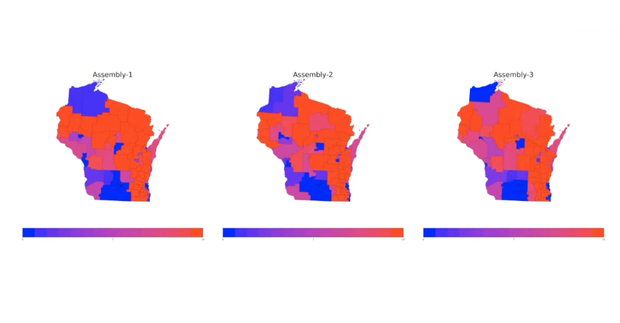Commission Proposes Legislative Maps Reducing GOP Advantage
State Legislature not required to consider maps from The People's Maps Commission.

A screenshot from a virtual public hearing held by the People’s Maps Commission showing potential partisan outcomes in proposed state Assembly districts.
Wisconsin Republicans would have a smaller advantage in the state Legislature under a set of redistricting maps proposed by a nonpartisan commission Thursday. The People’s Maps Commission, created last year by Gov. Tony Evers, unveiled three potential maps for Wisconsin’s congressional, state Assembly, and state Senate districts during a virtual public hearing Thursday evening.
In drawing the maps, the commission considered required criteria such as compactness and contiguity, and also emphasized “partisan fairness.” According to commission chair Christopher Ford, suggestions were given by more than 1,800 Wisconsinites in 68 counties.
She said if the commission’s maps were enacted, the Republican advantage in the Legislature would be less than under the current maps, which were drawn a decade ago by Republicans and declared an unconstitutional partisan gerrymander by a federal court in 2016.
“To my eye, what you’ve done is you’ve been able to find maps that don’t always lock in advantage for one party or the other,” Duchin said.
However, Duchin said that Republicans would maintain a slight advantage under any of the maps because many of the state’s democratic voters are clustered together in cities like Milwaukee and Madison. By her calculations, Republicans would maintain at least 53 percent of seats in the state Assembly under any of the three proposed maps.
“If you draw districts against the real political geography of most any American state, districts tend to confer a geographic advantage to Republicans, who at this time in U.S. history are more spread out across rural areas while Democrats are a bit more concentrated,” she said.
Assembly Speaker Robin Vos, R-Rochester, is also taking public input for redistricting with a website where Wisconsin residents can submit their suggestions for district maps through Oct. 15. Although the Legislature can consider the maps proposed by the commission, it isn’t required to.
The U.S. Census Bureau released its data in August, officially kicking off this decade’s cycle of redistricting. In Wisconsin, there are already several lawsuits related to redistricting, filed in both federal and state courts.
Republicans would have less of an advantage in the Legislature under commission’s proposed maps was originally published by Wisconsin Public Radio.
More about the Gerrymandering of Legislative Districts
- Without Gerrymander, Democrats Flip 14 Legislative Seats - Jack Kelly, Hallie Claflin and Matthew DeFour - Nov 8th, 2024
- Op Ed: Democrats Optimistic About New Voting Maps - Ruth Conniff - Feb 27th, 2024
- The State of Politics: Parties Seek New Candidates in New Districts - Steven Walters - Feb 26th, 2024
- Rep. Myers Issues Statement Regarding Fair Legislative Maps - State Rep. LaKeshia Myers - Feb 19th, 2024
- Statement on Legislative Maps Being Signed into Law - Wisconsin Assembly Speaker Robin Vos - Feb 19th, 2024
- Pocan Reacts to Newly Signed Wisconsin Legislative Maps - U.S. Rep. Mark Pocan - Feb 19th, 2024
- Evers Signs Legislative Maps Into Law, Ending Court Fight - Rich Kremer - Feb 19th, 2024
- Senator Hesselbein Statement: After More than a Decade of Political Gerrymanders, Fair Maps are Signed into Law in Wisconsin - State Senate Democratic Leader Dianne Hesselbein - Feb 19th, 2024
- Wisconsin Democrats on Enactment of New Legislative Maps - Democratic Party of Wisconsin - Feb 19th, 2024
- Governor Evers Signs New Legislative Maps to Replace Unconstitutional GOP Maps - A Better Wisconsin Together - Feb 19th, 2024
Read more about Gerrymandering of Legislative Districts here





















While the legislature will reject the commission’s work, the map could come into play if this goes to court which is almost a certainty.